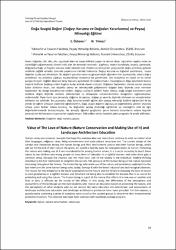| dc.contributor.author | Özhancı, Esra | |
| dc.contributor.author | Yılmaz, Hasan | |
| dc.date.accessioned | 2017-07-13T06:59:59Z | |
| dc.date.available | 2017-07-13T06:59:59Z | |
| dc.date.issued | 2015 | |
| dc.identifier.uri | https://hdl.handle.net/20.500.11776/1913 | |
| dc.description.abstract | İnsanı değerler; dili, dini, ırkı, yaşamsal alanı ve sosyo-kültürel yapısı ne olursa olsun, toplumları ayakta tutan ve sürekliliğin sağlanmasında önemli rolü olan bir evrensel kavramdır. Şüphesiz, insanın kendisiyle, insanla, çevresiyle, doğayla kurduğu ve hayatın sonuna kadar sürecek olan irtibatın ve etkileşimin çerçevesinin doğru çizilmesi, gelecek nesillerin sağlıklı temeller üzerinde yaşamasını mümkün kılacaktır. Doğayı koruma ve doğadan yararlanma, insani değerler içinde yer almaktadır. Bu değerin çocuklarımızın ve gençlerimizin eğitiminin her aşamasında, onlara doğru anlatılması, bu anlamda sağduyu kazandırılması toplumsal bir gerekliliktir. Zira toplumun en küçük ve en temel parçası bireydir. Sağlıklı düşünen birey toplumu aydınlatan ilk mekanizmadır. İnsanoğlunun doğa üzerindeki baskısı insanlık tarihinin başlangıcından bugüne kadar artarak devam etmiştir. Doğadan faydalanan, zaman zaman sonuna kadar sömüren insan, son yüzyılda sanayi ve teknolojideki gelişmelerle doğaya bariz biçimde zarar vermeye başlamıştır. Bu denge bozulmasının nedeni; doğaya yaklaşım şeklinin hatalı olması, doğa sevgisi kavramının yeni nesillere doğru biçimde empoze edilememesi ve dolayısıyla koruma-kullanma dengesinin sağlanamaması nedeniyledir. Oysa insan aynı zamanda, doğanın bir parçası, doğayı şu veya bu biçimde etkileyen ve sonuçlarından etkilenen rol sahibidir. Bu çalışmada; doğa koruma temelli eğitim alan peyzaj mimarlığı bölümü öğrencileri ile bu yönde bir eğitim almayan üniversite öğrencilerinin, doğa sevgisi değerini algılayış ve değerlendiriş şekilleri arasında ortaya çıkan farklar ortaya konmuş, bu bağlamda peyzaj mimarlığı eğitiminin ve mesleğinin rolü ile ilgili değerlendirmelerde bulunulmuştur. Bu amaçla; öğrenci gruplarına çevre koruma tutumlarını ortaya koymak amacıyla bir dizi sorudan oluşan anket uygulanmıştır. Elde edilen veriler istatistik paket programı ile analiz edilmiştir. | en_US |
| dc.description.abstract | Human values are universal concepts that keep the societies alive and make them continue to exist no matter what their languages, religions, races, living environments and socio-cultural structures are. The correct design of the contact and interaction among the human beings and their environment, nature and other human beings, which will last till the end of their natural life spans, will enable a healthy basis for next generations to live on. Protecting the nature and making use of it are considered to be among human values. It is a social necessity to teach these values to our children and young people at every level of education in a rightful manner and make them gain a common sense, because the smallest and the most basic unit of the society is the individual. Healthy-thinking individual is the first mechanism to enlighten the society. The pressure of the human being on the nature has been increasing throughout the history. The human beings who made use of the nature and sometimes exploited it to the last extent are the same human beings who, today, damage it with the latest industrial and technological advances. The reason for this imbalance is the faulty approaches to the nature and the failure in imposing the love of nature to next generations in a rightful manner and therefore not being able to establish the balance that is so crucial for protecting and using the nature. The human being is a part of the nature that affects it in one way or another and that, in turn, is affected by the results of this effect. In this study, the differences of the perceptions and assessments of the landscape architecture students who receive an education based on protecting the nature, and the perceptions of other students who do not receive the same education are determined, and assessments of landscape architecture education and landscape architecture profession have been provided. For this reasons, a questionnaire containing a series of questions were asked to the student groups to determine their environmental protection manners. The obtained data have been analyzed with statistical package program. | en_US |
| dc.language.iso | tur | en_US |
| dc.publisher | Namık Kemal Üniversitesi, Ziraat Fakültesi | en_US |
| dc.rights | info:eu-repo/semantics/openAccess | en_US |
| dc.subject | Değerler | en_US |
| dc.subject | doğa koruma | en_US |
| dc.subject | peyzaj | en_US |
| dc.subject | Values | en_US |
| dc.subject | nature conservation | en_US |
| dc.subject | landscape | en_US |
| dc.title | Doğa Sevgisi Değeri (Doğayı Koruma ve Doğadan Yararlanma) ve Peyzaj Mimarlığı Eğitimi | en_US |
| dc.title.alternative | Value of The Love of Nature (Nature Conservation and Making Use of It) and Landscape Architecture Education | en_US |
| dc.type | article | en_US |
| dc.relation.ispartof | Tekirdağ Ziraat Fakültesi Dergisi | en_US |
| dc.department | Tekirdağ Namık Kemal Üniversitesi Dergileri | en_US |
| dc.authorid | 183301 | en_US |
| dc.authorid | 2611 | en_US |
| dc.identifier.volume | 12 | en_US |
| dc.identifier.issue | 1 | en_US |
| dc.identifier.startpage | 39 | en_US |
| dc.identifier.endpage | 45 | en_US |
| dc.relation.publicationcategory | Makale - Ulusal Hakemli Dergi - Başka Kurum Yazarı | en_US |



















